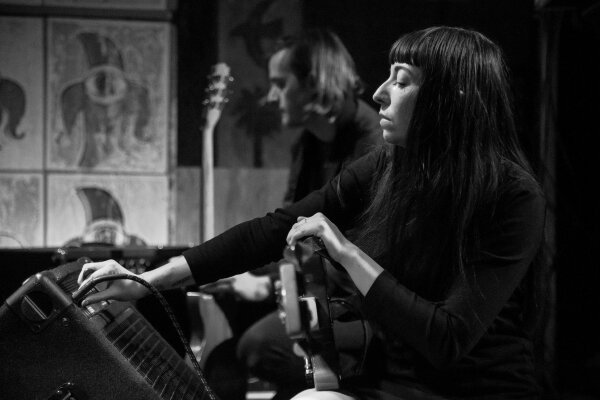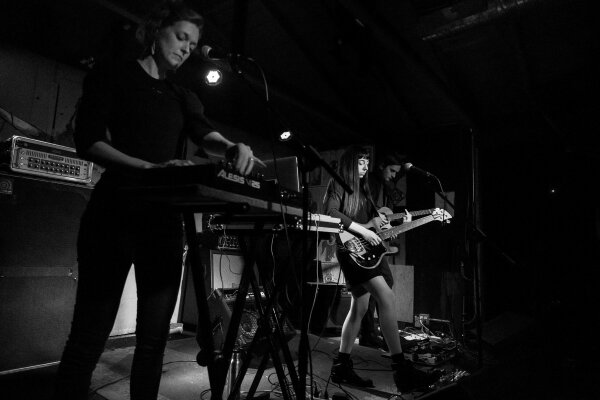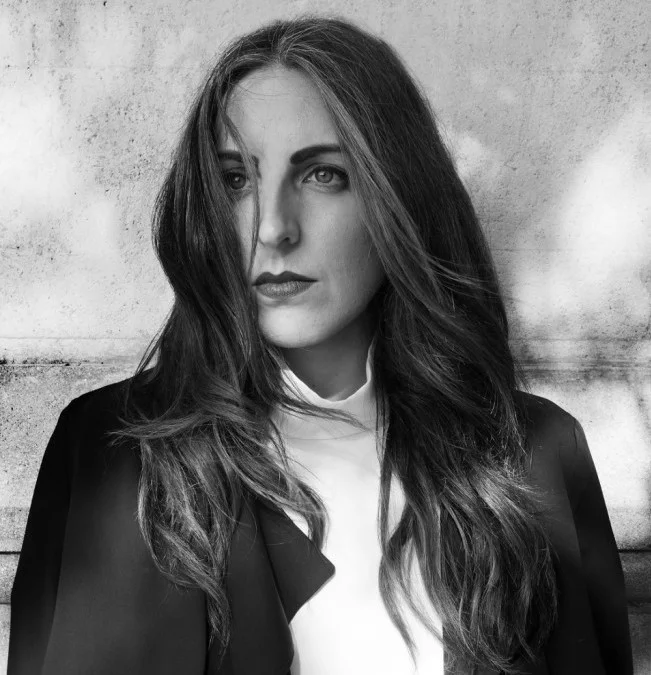MJ GUIDER
Photo by by Michelle Wacker / Smoking Hammer Photography
New Orleans-based producer, radio DJ, and multi-instrumentalist Melissa Guion creates mesmerizing dark and atmospheric soundscapes. Emerging with her 2016 debut LP Precious Systems, in 2020 she released her follow up album Sour Cherry Bell.
In this interview with Natálie Zehnalová, Melissa reveals the unique ways that New Orleans has influenced her sound, how she attempts to translate visual chiaroscuro into auditory high contrasts, the challenges of finding the right headspace to create, her treasured collection of obscure found images, and more…
Interview by Natálie Zehnalová
Can you tell me more about your background and growing up in New Orleans? Can you describe your musical development and the process of finding your sound as MJ Guider?
Where I grew up was near the airport, and down the street from a horse racetrack, so there was a lot of noise in and outside the house. I was always either listening to music or making it, maybe to add to the din or cover it up or control it somehow, I’m not sure. I started piano lessons when I was six and the whole thing escalated until I had a music degree and was feeling really suffocated and jaded.
Bryan Funck (from Thou) — who I’d known since high school — had been putting on shows for years at that point, and the DIY scene he’d been fostering had all the things I felt like I was missing. So I got more involved in that, started organizing shows with a friend for a while, and was playing in bands. That was really liberating, really energizing. What I really wanted was to just wing it, so I did.
MJ Guider came out of feeling restless again. I was curious about new sounds and wanted to experiment more than I could in the bands I’d been playing in at the time. I also felt like I’d gotten enough distance from all the formal training where I could tap that part of my brain again and use it on my own terms. My sound is as indebted to first picking up something I didn’t know or want to know how to use and making music with it as it is to all the years I spent singing middle voicing in a couple dozen or so choirs.
Speaking of your recent album Sour Cherry Bell, you explained you wanted to use the same tools as on your debut Precious Systems to see how far you can get. How did you make the choice on the first record and can you describe differences in the creative process?
Bass, drum machine, some effects, a computer, and my voice have been the core of the sound since the very beginning, when I recorded the first EP in 2012/2013. I haven’t had to add much to that to do what I wanted from one recording to the next.
Really, I get a lot of satisfaction around taking something that already exists and making it into something else entirely by any means necessary. I spent more time working in the computer for Sour Cherry Bell than I did for Precious Systems, but that’s the progression. There are so many ways to get from point A to point B. Ultimately you don’t need much stuff to make exactly the kind of music you want to make.
Sour Cherry Bell, 2020, Kranky Records
Sour Cherry Bell was in the making over the span of three years and finished in a period of focused work. What puts you in a headspace to make music?
Not being hungry. That’s the main thing.
But really, though, the “right” headspace is difficult to come by, and sometimes I’ll go months at a time without finding myself in it. I’ve worked to get away from the idea that I have to be in the zone to make music. Sometimes it takes days or weeks of plugging away at something, of making myself show up to music making even if I’m not feeling it to get into the right headspace. Then when I’m in it, it’s all-consuming. It’s taken a lot of practice, and it’s still not perfect.
Sour Cherry Bell was recorded between your rehearsal space and your home. How did being in the privacy of your home influence the process? And has your perception of your home changed in some way since we have been involuntarily stuck indoors?
Home is freeing in more ways than not, but I can’t do everything at home. The loud stuff has to happen at the rehearsal space. It’s also not total privacy because at any given time up to thirteen people can hear me and I can hear them. But being home does let me work for long hours, for days at a time, without having to pack up and lose momentum.
As far as lockdown/pandemic time goes, my life before this was almost as cloistered, so my perception of it is more or less the same — that I’m content to be there most of the time.
You mentioned in an interview that you are a keen observer, particularly attentive to your surroundings. Could you elucidate, to people unfamiliar with the city, which aspects of New Orleans do you see reflected in your music?
New Orleans is a part of whatever I do, whether or not I want it to be. There’s a density, an intensity that I couldn’t shut out if I tried. It’s a sinking city. It’s beautiful, decaying, frequently dancing with danger and rolling with chaos. What I make inevitably reflects that. I’m in it every day. It’s the only place I really know.
As a keen observer, do you have thoughts on how the environment we inhabit influences our lives more broadly speaking?
A person’s environment wields a lot of power on them no matter where it is, or how it is. Because it’s not just a geographic location, right? It’s not just the weather. It’s the people in your life, it’s the world inside of your own head, it’s all the experiences you carry with you wherever you go, it’s energy. All of that makes your environment which is reflected back in how you move through the world, what you take from it and give to it, what you do or don’t do back to it.
Photo by Jonathan Velazquez / JV Photo and Video
Your music is often described as having spatial qualities. If we stick to this metaphor, I would like to compare your albums to liminal space, a place of transition; it is inconspicuous on the surface but opens into great depths when you sit with it. Would you agree? And is there something that your music helped you discover — about yourself or the world?
That’s a good observation, I would agree with that. Something I really enjoy doing is trying to pull things apart to their furthest points, so you have two extremes. And then what’s happening in between them, in the middle space, is just as important if not more important than the outer edges where there’s more clarity and definition. It’s given me a more powerful lens to zero in on what isn’t as much as what is, to recognize and appreciate an overtone or implication, and take pleasure in the unknown.
There’s two songs I would like to know more about: “The Steelyard,” which has this persistent percussion pattern and unusually harsh energy, and the closing track “Petrechoria”, which sounds like a gentle breath of fresh air. What inspired each song? What motivated the progression from energetic towards calm songs on the album?
Across the album there’s fight and acceptance. It’s interesting you asked about those two because while I think of them both as being “acceptance” songs, they’re at the far opposite ends of that act. “The Steelyard” is unsettled in its acceptance while “Petrechoria” lets it roll right off. “The Steelyard” is nihilistic and bitter, the start of going through it, and “Petrechoria” is grace, the demons exorcised.
You cite visual art and cinema, and particularly the effect of high contrast, as an inspiration source. Can you elaborate on that? What are some films that have inspired you?
Besides that I think “chiaroscuro” is a cool word, I love the effect of bringing out intense depth by extremes of dark and light. It’s, again, that alteration of perception when the outer edges are so clear and you’re drawn to the difference, maybe without noticing.
I draw a lot of inspiration from films that create a very vivid world to live in for the duration of it, all-encompassing, and so saturate your brain that you can go back to visit just by thinking of it. A lot of the ones I love are extreme, surreal, and hyper-stylized. The first one I ever fell deep into was Gregg Araki’s Nowhere when I was a kid. That movie hit my teenage brain at the perfect moment and left an indelible mark. Lately I’ve been thinking about Peter Greenaway’s The Cook, The Thief, His Wife, and Her Lover, and Alain Resnais’s Last Year at Marienbad. Henri-Georges Clouzot would have made the ultimate had he gotten to finish L’Enfer…
You have this library of collected images on your website, can you tell me more about that? Where do you most often turn to when in search for visual inspiration?
The image library is something I started years ago as a way to share something visual without social media. Every image in the library holds some kind of meaning or serves some purpose. I’m a chronic collector of images, and have folders of them for different purposes scattered across hard drives, computers, and various accounts. Outside of music I work in graphic design, so I’m always saving things that grab me and I might want to reference later. Some images come from my library of art and design books, some are film and TV stills, others I stumble across on the Internet or snap photos of out in the world. Flipping through one of my favorite books or watching a movie are my usual visual inspiration go-to’s.
There are a lot of purple hues in your album artworks and music videos, what draws you to it? I’m asking because I’ve been attracted to this color recently and see it everywhere.
It’s a beautiful color, isn’t it? I can’t explain exactly why I’m drawn to it, but I can’t seem to quit purple. I’ve even made some attempts to steer the color palette elsewhere but I always end up right back at purple.
Do you miss performing live? What is the greatest challenge of translating your music into a live performance?
There are things I miss about performing live. I miss seeing other places, being around music friends, and getting to meet new ones, I miss the energy in the room. I don’t miss the ever-present technical problems and inevitably losing my voice…
It took a few years before there was ever a live show because I envisioned something more engaging than me standing still on stage with my bass and a computer and a few gadgets. I wanted more to be happening than I could do with my hands mostly occupied — I wanted something huge. The solution has been including other musicians on tour, which, if you saw an MJ Guider show in 2018 or 2019 were Mike Wilkinson of Marker (who also created the projections for those shows) and Emily McWilliams of Silver Godling. I’ll still perform solo when the occasion calls for it, but that’s a different show. I like that it’s different.
Photo by Jonathan Velazquez / JV Photo and Video
The times are difficult and unpredictable. Do you have something that you’re looking forward to this year?
Some special projects in the works. And last year around this time I bought a bathing suit, thinking I would finally go swimming after way too many swim-less summers. The only time I wore it was on New Year’s Eve to hang out at home in some jeans and not a pool, just to have worn it in 2020. I’m looking forward to wearing the swimsuit this year, for swimming.
Anything else you’d like to share?
Make whatever weird shit you really want to make. If you love it, if you love making it, if it’s in your authentic, uninhibited voice, that’s more personally satisfying than any number of (insert X contemporary validation statistic here).
Buy MJ Guider’s music and check for updates on her site and Instagram
You might also like our interviews with these musicians:









